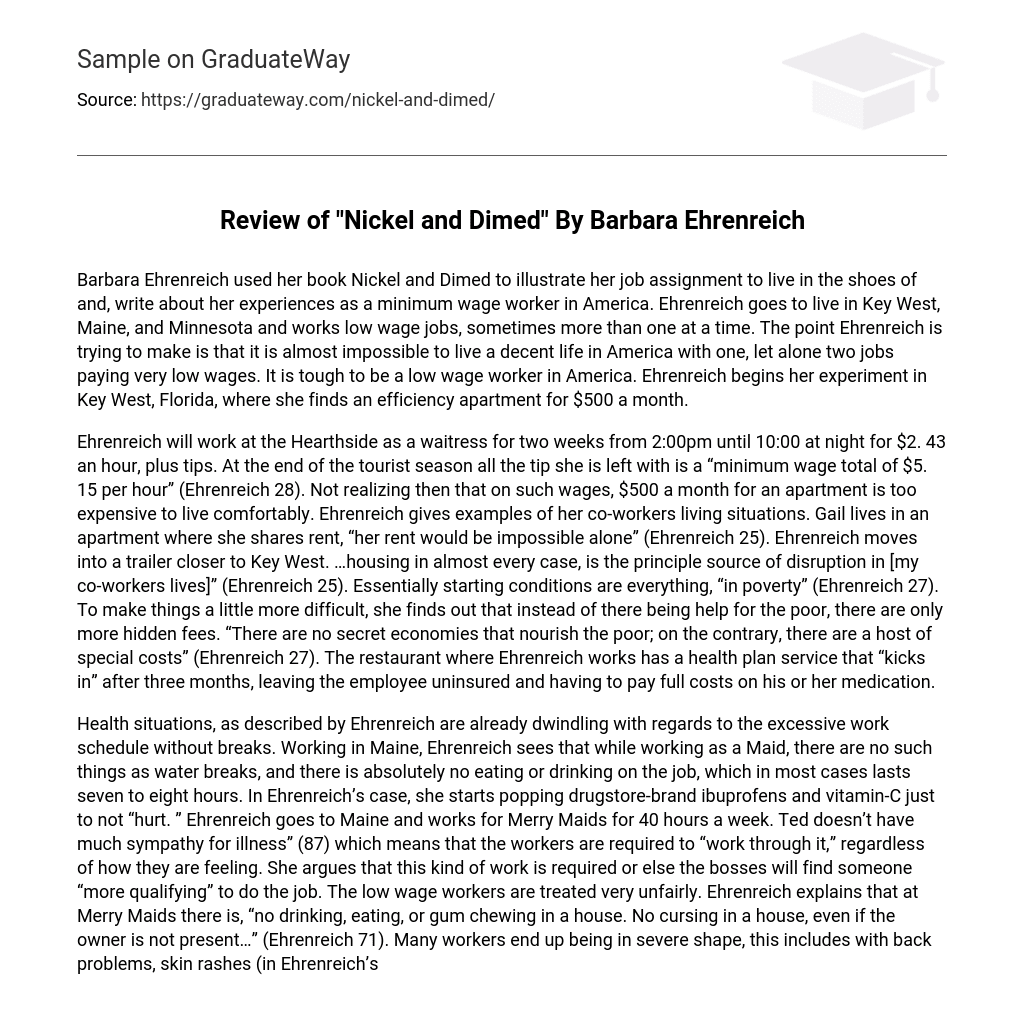In her book, Nickel and Dimed, Barbara Ehrenreich delves into the lives of minimum wage workers in America. She chronicles her firsthand experiences residing and working in Key West, Maine, and Minnesota while simultaneously undertaking different low-paying jobs. The objective behind Ehrenreich’s account is to shed light on the daunting obstacles encountered by individuals striving to sustain themselves with meager wages in the United States. Among her initial undertakings is finding a reasonably priced efficiency apartment for $500 per month in Key West, Florida.
Ehrenreich will work as a waitress at the Hearthside from 2:00pm to 10:00pm, earning $2.43 per hour plus tips. However, she realizes that her total income, including tips, only equals the minimum wage of $5.15 per hour. This makes it challenging for her to afford a monthly rent of $500 for an apartment. To further illustrate her point, Ehrenreich shares examples of her co-workers’ living situations – like Gail who can only afford an apartment by sharing it with someone else. Ehrenreich sees housing as the primary issue affecting their lives and decides to move into a trailer closer to Key West. The initial conditions greatly impact individuals’ living circumstances when they are in poverty.
Additionally, Ehrenreich discovers that instead of receiving assistance, the poor face extra hidden expenses and various special costs without any hidden economic advantages.The restaurant where Ehrenreich works offers health insurance coverage after three months of employment. As a result, employees are left without insurance and have to pay for medication on their own.
Ehrenreich portrays the deteriorating health conditions caused by grueling work schedules without breaks. In her experience as a Maid in Maine, she witnessed the absence of water breaks and the prohibition of eating or drinking during shifts that typically last seven to eight hours. To cope with the pain, Ehrenreich resorting to consuming drugstore-brand ibuprofens and vitamin C. During her 40-hour workweek at Merry Maids, illness is not sympathized with, hence workers are compelled to soldier on regardless of how they feel. Failure to comply with this demanding work is met with the risk of being replaced by someone deemed “more qualified” for the job. The mistreatment of low-wage workers is evident, as exemplified in policies such as not allowing them to eat, drink, chew gum, or use curse words while on the job even if homeowners are absent. Consequently, many workers suffer from serious health issues including back problems, skin rashes like Ehrenreich experienced, and chronic migraines.
The workers often go without breaks and proper food, often relying on fast food or food vouchers, leading to malnourishment. Ehrenreich receives a food voucher that includes spaghetti noodles, sauce, vegetables, baked beans, and hamburger, lacking in nutritious options. She finds it difficult as a low-wage worker to afford regular fruits and vegetables from the grocery store. Ehrenreich desires the ability to take occasional days off and still be able to afford groceries. She randomly chooses Minnesota and believes there will be a fair balance between rent and wages. She decides to apply for a job at Wal-Mart in retail. After completing an application process including a survey and drug test, she is hired for $7 per hour. Working at Wal-Mart exposes her to the lack of human interaction in retail, feeling like she could be invisible.
The people in the store can also be very difficult to deal with and can turn happy individuals into frustrated and easily manipulated people. “There was a time when I couldn’t do anything but watch as a child pulled everything within his reach off the racks. My annoyance must have been evident on my face, as his mother eventually told him to stop” (165). In many instances, the friendly greeters who welcome customers into the store are actually unhappy and have unkind thoughts about anyone who visits. “I even find myself developing resentment towards customers for unrelated reasons…” (165).
Adapting to a sudden change in behavior can be challenging for any worker, regardless of their personality. It is important for individuals not to develop resentment towards their employers. According to Ehrenreich (165), what may initially seem like “aggressive hospitality” eventually turns into aggressive hostility. Through her personal experience, she realizes that in order to work at Wal-Mart, she must buy polo shirts. Unfortunately, all the shirts are priced at $7, which happens to be equal to her hourly salary. As Ehrenreich highlights, it is troubling when someone earns so little that they cannot even afford a discounted Wal-Mart shirt with a stain on it” (Ehrenreich 181).
Many low-wage jobs require employees to purchase clothing before starting work. For instance, Abercrombie and Fitch is a low-paying job that enforces a dress code, which changes every few months. However, most low-wage workers cannot afford the expense of new clothes (ranging from $70 to $80) while also covering necessary costs like electricity and groceries. According to Ehrenreich, this is similar to paying $49.5 only for storing clothes at Wal-Mart. One of her coworkers agrees that the compensation of $7 per hour does not adequately reflect the amount of effort put into the job. Ehrenreich believes that if she had been able to afford continuing working at Wal-Mart, she could have utilized her time more efficiently and saved money instead of essentially giving it back to her employer.
In the book Nickel and Dimed, a woman from an upper middle class background decides to immerse herself in near poverty to gain insight into the difficult realities of American life. Throughout her experience, she realizes that this way of living is both physically and mentally exhausting, making it exceptionally challenging to sustain a respectable and healthy lifestyle while working demanding jobs for long hours with minimal pay.





